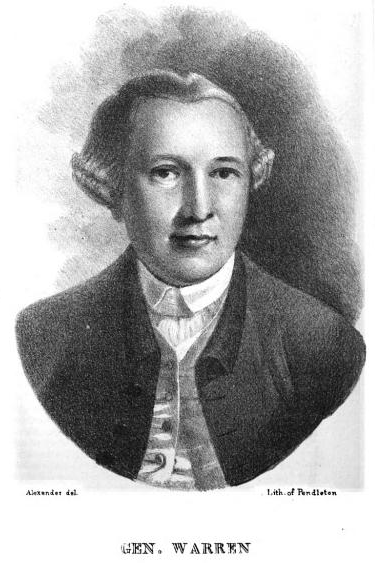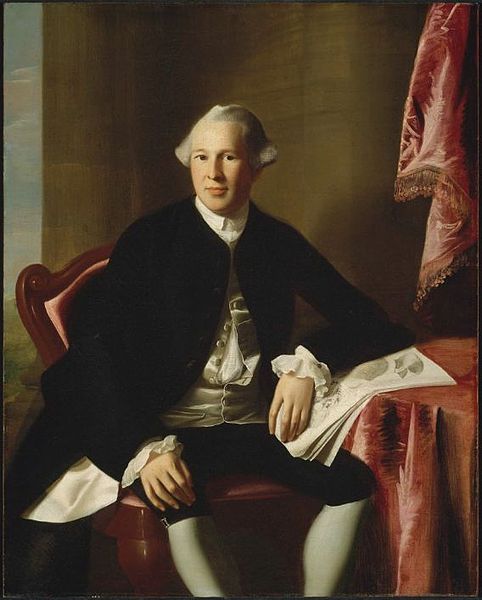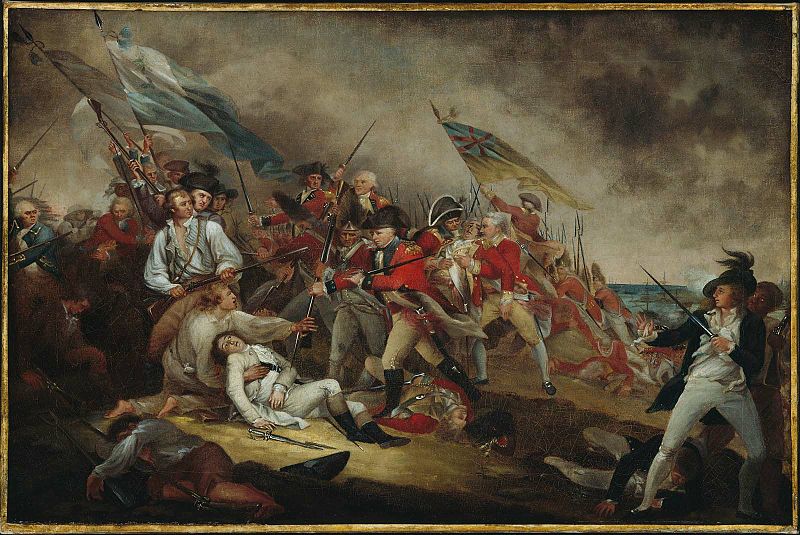<Back to Index>
- President of the Massachusetts Provincial Congress Joseph Warren, 1741
PAGE SPONSOR


Dr. Joseph Warren (June 11, 1741 – June 17, 1775) was an American doctor who played a leading role in American Patriot organizations in Boston in early days of the American Revolution, eventually serving as president of the revolutionary Massachusetts Provincial Congress. Warren enlisted Paul Revere and William Dawes on April 18, 1775, to leave Boston and spread the alarm that the British garrison in Boston was setting out to raid the town of Concord and arrest rebel leaders John Hancock and Samuel Adams. Warren participated in the next day's Battles of Lexington and Concord, which are commonly considered to be the opening engagements of the American Revolutionary War.
Warren had been commissioned a Major General in the colony's militia shortly before the June 17, 1775 Battle of Bunker Hill. Rather than exercising his rank, Warren served in the battle as a private soldier, and was killed in combat when British troops stormed the redoubt atop Breed's Hill. His death, immortalized in John Trumbull's painting, The Death of General Warren at the Battle of Bunker's Hill, June 17, 1775, galvanized the rebel forces, and he has been memorialized in many place names in the United States.
Joseph Warren was born in Roxbury, Massachusetts, to Joseph Warren and Mary (Stevens) Warren. His father was a respected farmer who was killed in October 1755 when he fell off a ladder while gathering fruit in his orchard. After attending the Roxbury Latin School, Joseph enrolled in Harvard College, graduating in 1759, and then taught for about a year at Roxbury Latin. He studied medicine and married 18 year old heiress Elizabeth Hooten on September 6, 1764. She died in 1772, leaving him with four children: Elizabeth, Joseph, Mary, and Richard.
While practicing medicine and surgery in Boston, he joined the Masonic Lodge of St. Andrew and eventually was appointed as a Grand Master. He also became involved in politics, associating with John Hancock, Samuel Adams and other radical leaders of the broad movement labeled Sons of Liberty. Warren conducted an autopsy on the body of young Christopher Seider in February 1770, and was a member of the Boston committee that assembled a report on the following month's Boston Massacre. Earlier, in 1768, Royal officials tried to place his publishers Edes and Gill on trial for an incendiary newspaper essay Warren wrote under the pseudonym A True Patriot, but no local jury would indict them.
In 1774, he authored a song, "Free America," which was published in colonial newspapers. The poem was set to a traditional British tune, "The British Grenadiers."
As Boston's conflict with the royal government came to a head in 1773 - 75, Warren was appointed to the Boston Committee of Correspondence. He twice delivered orations in commemoration of the Massacre, the second time in March 1775 while the town was occupied by army troops. Warren drafted the Suffolk Resolves, which were endorsed by the Continental Congress, to advocate resistance to Parliament's Coercive Acts. He was appointed President of the Massachusetts Provincial Congress, the highest position in the revolutionary government.
In mid April 1775, Warren and Dr. Benjamin Church were the two top members of the Committee of Correspondence left in Boston. On the afternoon of April 18, the British troops in the town mobilized for a long planned raid on the nearby town of Concord, and already before nightfall word of mouth had spread knowledge of the mobilization widely within Boston. It had been known for weeks that General Gage in Boston had plans to destroy munitions stored in Concord by the colonials, and it was also known that they would be taking a route through Lexington. Warren received the additional information from a highly placed informant that the troops also had orders to arrest Samuel Adams and John Hancock. Warren sent William Dawes and Paul Revere on their famous "midnight rides" to warn Hancock and Adams in Lexington about the approaching troops. The historian of colonial America, David Hackett Fischer, finds strong, but inconclusive, evidence that Warren's highly placed informant was none other than Margaret Gage, the wife of General Thomas Gage.
Warren slipped out of Boston early on April 19, and during that day's Battle of Lexington and Concord, he coordinated and led militia into the fight alongside William Heath as the British Army returned to Boston. When the enemy were returning from Concord, he was among the foremost in hanging upon their rear and assailing their flanks. During this fighting Warren was nearly killed, a musket ball striking part of his wig. When his mother saw him after the battle and heard of his escape, she entreated him with tears again not to risk life so precious. "Where danger is, dear mother," he answered, "there must your son be. Now is no time for any of American’s children to shrink from any hazard. I will set her free or die." He then turned to recruiting and organizing soldiers for the Siege of Boston, promulgating the Patriots' version of events, and negotiating with General Gage in his role as head of the Provincial Congress.
Warren was appointed a Major General by the Provincial Congress on June 14, 1775. He arrived where the militia was forming and asked where would the heaviest fighting be; General Israel Putnam pointed to Breeds Hill. He volunteered as a private against the wishes of General Putnam and Colonel William Prescott, who requested that he serve as their commander. Since Putnam and Prescott were more experienced with war he declined command. He was among those inspiring the men to hold rank against superior numbers. Warren was known to have repeatedly declared of the British: "These fellows say we won't fight! By Heaven, I hope I shall die up to my knees in blood!" He fought in the redoubt until out of ammunition, and remained until the British made their third and final assault on the hill to give time for the militia to escape. He was killed instantly by a musket ball in the head by a British officer (possibly Lieutenant Lord Rawdon) who recognized him. This account is supported by a 2011 forensic analysis. His body was stripped of clothing and he was bayoneted until unrecognizable, and then shoved into a shallow ditch.
British Captain Walter Laurie, who had been defeated at Old North Bridge, later said he "stuffed the scoundrel with another rebel into one hole, and there he and his seditious principles may remain." His body was exhumed ten months after his death by his brothers and Paul Revere, who identified the remains by the artificial tooth he had placed in the jaw. This may be the first recorded instance of postmortem identification by forensic odontology. His body was placed in the Granary Burying Ground and later (in 1825) in St. Paul's Church before finally being moved in 1855 to his family's vault in Forest Hills Cemetery.
There are at least three statues of Joseph Warren on public display. Two are in Boston — one in the exhibit lodge adjacent to the Bunker Hill Monument, the other on the grounds of the Roxbury Latin School. The third is in a small park on the corner of Third and Pennsylvania avenues in Warren, Pennsylvania, a city, borough, and county all named after the general.
At the time of Warren's death, his children were staying with his fiancee, Mercy Scollay, in Worcester as refugees from the Siege of Boston. She continued to look after them, gathering support for their education from John Hancock, Samuel Adams, Mercy Otis Warren, Benedict Arnold and even the Continental Congress. Joseph's youngest brother and apprentice in medicine, John Warren, served as a surgeon during the Battle of Bunker Hill and the rest of the war, and afterwards founded Harvard Medical School and co-founded the Massachusetts Medical Society.
General Gage reportedly said Warren's death was equal to the death of 500 men. It encouraged the revolutionary cause because it was viewed by many Americans as an act of martyrdom. Fourteen states have a Warren County named after him. Additionally, Warren, Pennsylvania, Warren, Michigan, Warren, New Jersey, Warren County, New Jersey, Warrensburg, New York, Warrenton, Virginia, Warren, Maine, Warren, Massachusetts, and 30 Warren Townships are also named in his honor. Boston's Fort Warren, started in 1833, was named in his honor. Five ships in the Continental Navy and United States Navy were named Warren in his honor.
American actor Walter Coy played Dr. Warren in the 1957 film Johnny Tremain.
